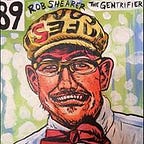Little Mexico and Oak Cliff and ‘Progress’ in Dallas, Texas
While block walking in my neighborhood of Kidd Springs with Giovanni Valderas during his run for Dallas City Council, I met an older gentleman who was sweeping his sidewalk.
I explained who I was and why I was supporting Giovanni’s efforts to build a stronger, safer Oak Cliff by investing in our people and our neighborhoods. We talked about the pressure that rising property taxes were creating on his fixed income budget, and about the large apartment developments that seemed to be coming closer and closer to his small, single family home.
He explained to me that when his family had moved to Dallas, they lived in Little Mexico. And he remarked that the development he was seeing in Oak Cliff reminded him of the pressure that eventually forced him out of his family home and into his current Oak Cliff home. “I’m not sure how much longer I’ll be able to hold on,” he said.
Many residents in Dallas today have no memory of Little Mexico. They simply know it as Uptown. What was once the heart of the Hispanic community in Dallas is now upscale retail and soaring office and apartment buildings. But the process to displace a thriving community for the sake of “progress” is a cautionary tale for Oak Cliff.
For years aggressive plans for growth were sold by city leaders as necessary to grow the tax base so that the rising tax revenue could be used to address infrastructure costs such as street maintenance. And yet, as the revenue for the city of Dallas doubled over the last decade, often what we have experienced is a reduction in city services. (Remember when we had trash pick up twice a week?)
It seems it is beyond time for our city council members to be more critical of our city budget instead of acting as cheerleaders for new development and calling it “progress”. We need elected officials who will push back on offering incentives to developers and instead place a renewed focus on providing better city services for long time home owners. It is time to acknowledge that the steep increase in our property values is not sustainable for many of our home owners.
And we need to prioritize creating more affordable housing, and a significant portion of that needs to be single family homes.
Amy Ledbetter Parham, the executive director of Habitat for Humanity Texas, published an opinion piece in the Dallas Morning News recently on the topic of affordable housing. Her analysis stated that there is not a single part of Texas where someone who earns minimum wage can afford a modest, two-bedroom apartment. The median income in District 1 according to the last census report was approximately $40,000 per year, which is significantly higher than minimum wage, but virtually none of the new housing that has been created in the last several years in Oak Cliff is affordable at this income level. Parham writes:
You want productive, taxpaying citizens? Then make sure people have access to decent shelter. Give them a figurative and literal foundation from which to launch. Ask your city officials what their plan is to invest in housing infrastructure and homeownership, and don’t be afraid of who your neighbors might be. Often, when a term like “affordable housing” is used, people assume that means something bad like reduced property values or increased crime. In actuality, that just might mean your child’s kindergarten teacher is moving in next door.
For many, the way the city works is a mystery and the assumption is that there is little a councilperson can do to address the problems that Oak Cliff’s working families face. But the reality is there are very real solutions that can be used to address the root cause, but it requires courage and the political will to buck the status quo.
It also requires deeply understanding the problem and more proximity to those most impacted. Many of us who are more financially secure in District 1 don’t have relationships with neighbors in the district who are at risk of being displaced.
This is not a call to return to a previous time, or roll back the clock on development. But this is a call to all of us to expand the way we think about the changes that are occurring in our neighborhood. To understand the history of practices like red lining and disinvestment and to realize that those aren’t things that live in the past, but are actually still at work in policies in place today.
I am hopeful that as we all continue to learn and grow, we will work together to develop more progressive and people centered policies at the city, state and federal level that will result in more safe, stable neighborhoods for all families, regardless of income.
